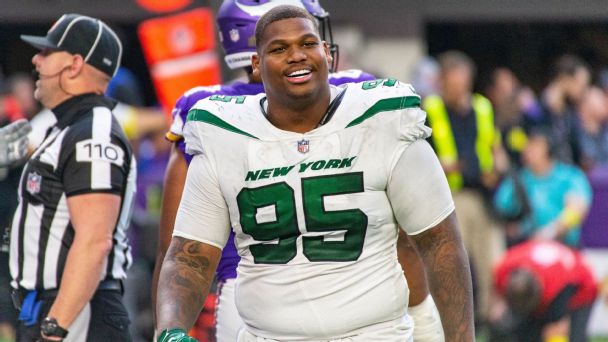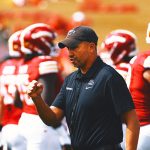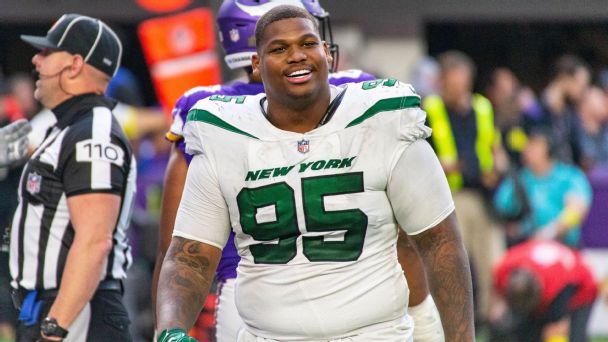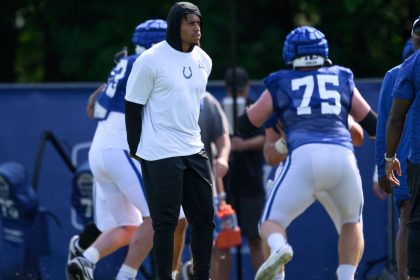
FLORHAM PARK, N.J. — Quinnen Williams knows the recent history. Before his end-of-season news conference, the one where he announced his demand for a contract extension, the New York Jets‘ star defensive tackle researched the team’s track record for re-signing its first-round picks. He did the homework, not his agent. He seemed taken aback by his findings.
“I’ve seen the stat that they haven’t re-signed a first-round draft pick in the last seven to 10 years, something like that,” Williams told reporters that day.
In fact, the Jets are the only team that didn’t re-sign any of its first-rounders from 2012 to 2018 to a second contract, according to ESPN Stats & Information. The last one to get an extension was defensive lineman Muhammad Wilkerson, picked in 2011.
Williams, drafted third overall in 2019, wants to change the trend. He covets a long-term deal so he can be part of what he called “the New York Sack Exchange 2.0.” The Jets want that, too — the two sides have been in discussions for about two months — but the exploding market for premier defensive tackles has raised the stakes. It has turned into a game of “Can you top this?”
Since early March, the Washington Commanders‘ Daron Payne ($22.5 million average per year) and the Tennessee Titans‘ Jeffery Simmons ($23.5 million APY) have signed blockbuster extensions, with Payne’s deal coming on a franchise tag. In free agency, Javon Hargrave landed $21 million APY from the San Francisco 49ers.
Williams, the Miami Dolphins‘ Christian Wilkins and the New York Giants‘ Dexter Lawrence — all drafted ahead of Simmons in the 2019 first round — are waiting in line at the ATM. Williams, the only one in the group with a first-team All-Pro selection on his NFL résumé, has a strong case to be the highest-paid defensive tackle not named Aaron Donald, based on performance and the current market.
The Los Angeles Rams superstar reset the market — and then some — with a three-year, $95 million contract in June 2022. At $31.7 million per year, it was about $10 million more than the next-highest defensive tackle at the time.
Recognizing Donald and his contract as outliers, Williams isn’t thought to be seeking that kind of money. He’s probably targeting the $23 million to $25 million-a-year range. Not long ago, top quarterbacks made that much, but the defensive tackles — helped by Donald and a group of mid-20s tackles who have elevated the position — have blown up the financial landscape.
Without a new contract, Williams won’t report Monday for the start of the offseason program, something he vowed when he went public with his position at the end of the season. The workouts are voluntary until June 13, the start of mandatory minicamp. His decision on whether to participate in the mandatory camp will hinge on the progress of negotiations. If he skips, he’s subject to a fine. Perhaps it won’t reach that point as the two sides continue to hammer away at it.
At least one player from the 2019 first-round class — Tampa Bay Buccaneers linebacker Devin White — already has requested a trade because of slow progress in extension talks. Williams’ frustration hasn’t reached that level.
Jason Fitzgerald, an NFL contract/salary-cap expert who operates Overthecap.com, expects Williams to wind up as the second-highest-paid defensive tackle, behind Donald, saying, “It’ll be the whole ‘next man up’ kind of thing.”
“From a public relations standpoint, it would be a disaster if the Jets didn’t do [an extension],” said Fitzgerald, who believes they should’ve tried to sign Williams last season before the salaries started spiking. “The way I look at it, Williams has a ton of leverage because the Jets don’t have any guys they’ve extended recently. You want to put that positive vibe out there. Getting into a contract dispute with him, there’s probably not going to be anything positive out of that.”
Technically, the Jets don’t have to do anything because Williams is under contract for one more year — at a $9.6 million salary, the amount of his fifth-year option. In 2024, they can retain him with the franchise tag, which figures to be north of $18.9 million (the 2023 tag amount for defensive tackles).
General manager Joe Douglas, speaking at the recent league meetings in Phoenix, said negotiations are “in a positive place” with Williams’ agent Nicole Lynn.
“[There’s] no exact timeline for when that’s going to get done,” Douglas said, “but [I] had good conversations with Nicole.”
Williams knows the time to strike is now. He’s coming off his best year — All-Pro, Pro Bowl, team MVP. His sack total (12) and pressure percentage (13.4) were higher than those of Simmons, Lawrence, Wilkins and Payne. Jets defensive coordinator Jeff Ulbrich called it one of the best defensive performances he has ever been around, likening Williams to former 49ers great Bryant Young, a newly inducted member of the Pro Football Hall of Fame.
Williams’ four-year totals for sacks (27.5) and pass rush win rate (14.7%), an ESPN-generated metric, are greater than those of his aforementioned peers even though he has played significantly fewer snaps because of the Jets’ heavy rotation on the defensive line.
Three agents not affiliated with Williams, speaking on the condition of anonymity, offered different opinions.
One agent said Williams deserves to be the second-highest paid at the position, behind Donald. Another said he’s skeptical that Jets ownership will pay that much for a defensive tackle, especially with the expected addition of quarterback Aaron Rodgers and his $59 million salary for 2023.
The third agent said, “I don’t see the Jets committing that much money to [Williams]. Is he good? Yes, very good. Is he the No. 2 defensive tackle? No way.”
Simmons received $47.7 million in fully guaranteed money, so figure Williams is seeking something in that ballpark. It would be the largest guarantee in franchise history, passing linebacker C.J. Mosley ($43 million).
Perhaps the only knock against Williams is that he has had only one spectacular season. Then again, players in the trenches sometimes need longer to mature because of the physical demands. He was just 21 when he entered the league, and his rookie year was admittedly a struggle. He was good in 2020 and 2021 (13 sacks combined) before leaping into the elite category in 2022. Still only 25, he’s entering his prime years.
His contract could be a test case for the Douglas-led regime, which has yet to sign a single Jets draft pick to a multiyear extension. No doubt, spotty drafting by previous administrations has contributed to the trend. Only two former first-round picks were worthy of lucrative extensions — safety Jamal Adams and defensive tackle Leonard Williams — and both were traded away by Douglas for draft capital.
This business practice preceded Douglas, though. Of the 55 draft picks from 2012 to 2018, only two received multiyear extensions — wide receiver Quincy Enunwa and guard Brian Winters. They were sixth- and third-round picks, respectively. In 2013, the Jets made one of their biggest trades ever, dealing away future Hall of Fame cornerback Darrelle Revis because they didn’t want to do an extension.
Williams believes he deserves one. No one will argue with that. The hard part is finding common ground.
“It seems like haggling for the sake of haggling is pointless,” Fitzgerald said. “Every day they wait, it seems like it goes up by about a million bucks.”












